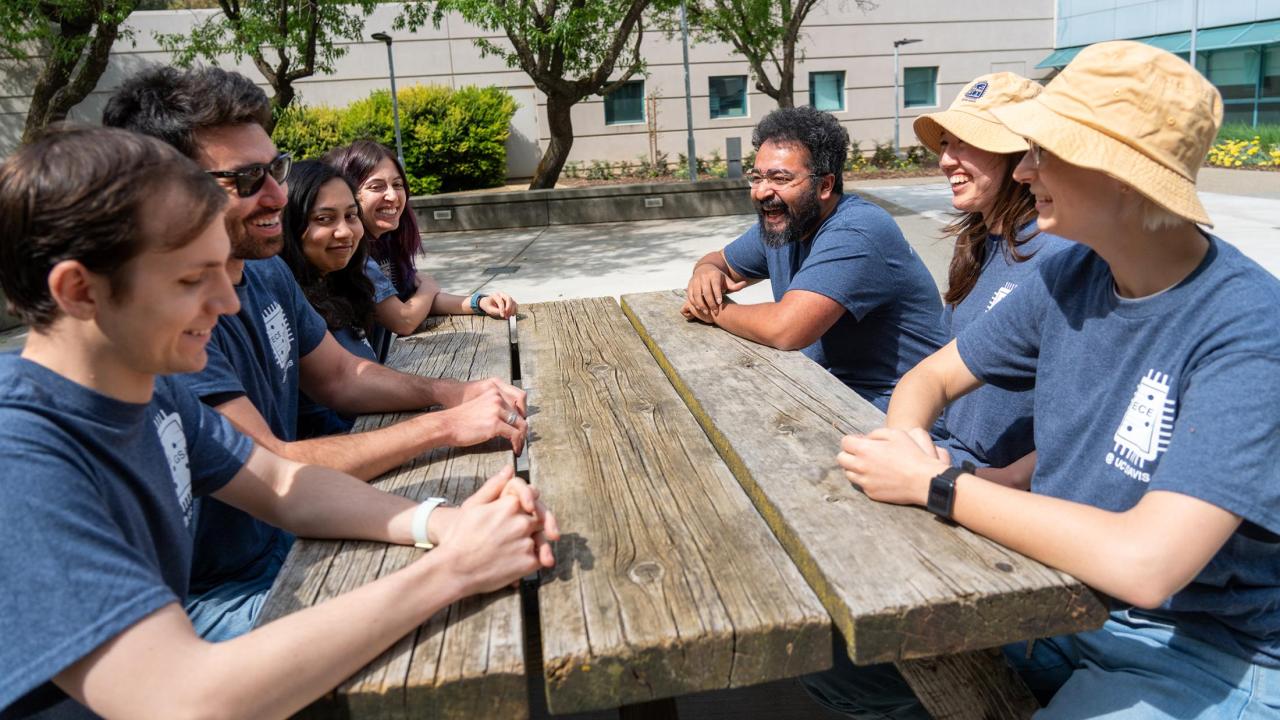
ECE Graduate Student Association Sparks Community
The Electrical and Computer Engineering Graduate Student Association, or ECE-GSA, fosters an environment of enrichment, collaboration and community at the University of California, Davis.
“Our mission is to assist ECE graduate students in achieving a productive, enjoyable and enriching experience at UC Davis,” said Calum Shelden, the ECE-GSA president.
To this end, the association hosts a variety of activities and programs for graduate students in the Department of Electrical and Computer Engineering, with both large-scale events and small meetings, to offer comprehensive support for ECE graduates.
For example, the association hosts recurring events like weekly coffee socials — held Fridays in Kemper Hall Courtyard — and barbecues and game nights to provide a space for graduate students to have fun and destress from their studies.
They also host technical events to support graduate students’ education and industry experience. These have included talks from professors within the department and informational sessions with representatives from Lawrence Livermore National Laboratory and companies like Texas Instruments and Analog Devices.
In addition to year-round programs, ECE-GSA hosts two major events each academic year that enrich its community.
The first event runs from November to January. Throughout this period, the association holds mock examinations for first- and second-year Ph.D. students to prepare for their preliminary examinations, which students must pass in the winter quarter to continue pursuing their Ph.D. program.
ECE-GSA’s other big annual event is its Picnic Day booth, “The Art of Semiconductors,” which saw its third iteration this year.
At the family-friendly booth, visitors can participate in art activities that demonstrate the process of semiconductor device fabrication.
“It requires a lot of planning,” said ECE-GSA Vice President M.A. Mort, “but every year it amazes me that we are able to pull it off with all the help from our fellow officers and volunteers of graduate students in our department.”
All that effort is worth it, both for community members and the graduate students who put it on, as Shelden notes.
“This event provides a platform for the general Davis community, often young, aspiring engineers and scientists, to engage with us as ECE grads and humanize us as STEM professionals.”
The ECE-GSA’s mission to enrich the student experience and spark community within the department is always growing as they consider and develop new projects.
“Typically, the development and implementation of a new event or program is led by one or two officers,” Shelden said. “However, I would describe the final product as a mosaic of the thoughts and ideas that all the officers contribute during our weekly officer meetings.”
The association’s most recent project builds off the success of its mentorship program for graduate students. This one, however, pairs undergraduate students with graduate student mentors, bridging the gap between the two groups.
The association developed this new program with the UC Davis chapter of the Institute of Electrical and Electronics Engineers, or IEEE, and the Club of Future Female Electrical Engineers, or COFFEE, who provided insight into the needs of ECE undergraduates. According to their recommendation, ECE-GSA hosted a panel where undergraduates could ask graduates questions and preview what mentorship would be like.
“Collaborating on this mentorship program has opened the door for collaborations on other activities with IEEE and COFFEE,” Shelden said. “I'm looking forward to seeing the connections between the organizations continue to grow.”
Currently, the program consists of 12 undergraduates and nine graduate students whom the ECE-GSA has paired by topics of interest, such as applying for graduate school, research opportunities and navigating college as a first-generation student. Nurturing these personal connections in the ECE community through its activities is the driving force for ECE-GSA’s work.
“The most rewarding part of being a member of the ECE-GSA is interacting with the students who come to our events and participate in our programs. I get to observe ECE-GSA achieving its goal and see that its work is valued by the community.”
For more information on the ECE-GSA and their work, check out their webpage or Instagram @ece_gsa.
